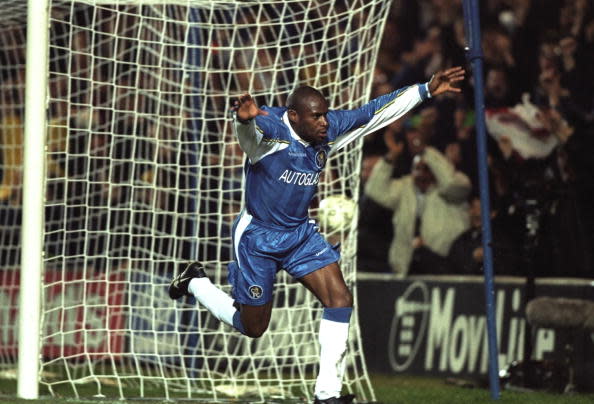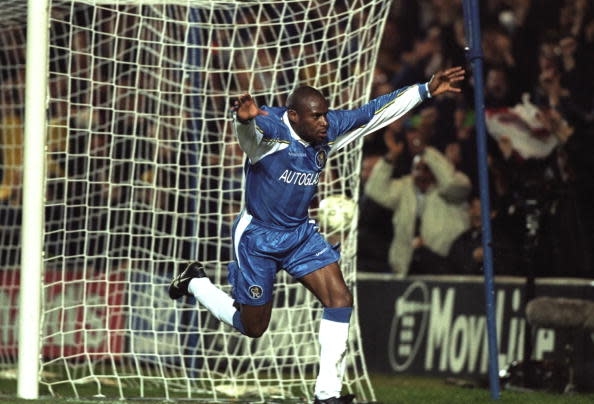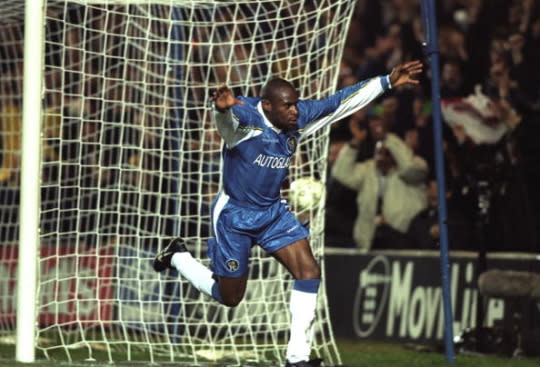Blast from the Past no.53: Frank Sinclair

Reviving the Premier League heroes you forgot existed…
It’s the unfortunate nature of being in the public eye that you can spend your whole career working really hard at the job you’re good at and, by the end of it all, you’re only remembered for one silly thing. In Frank Sinclair’s case, it’s actually two things. 1) That he scored an inordinate amount of own goals and 2) That his shorts once fell down while he was on the pitch.
While both of these things are undeniably true, and neither paints Sinclair in an especially elegant light, it would be unfair if they overshadowed the fact that - for the majority of the rest of his footballing life - he was just a good, no-nonsense centre-back.
The Lambeth-born defender broke into the Chelsea team in the days before they dined at the top table of Europe’s elite, which was just as well, because Sinclair was always more of a Harvester kind of guy. Solid, but never pretending to be anything special.
“He was an honest player and a proper Blue,” summarised one Chelsea fan on the Shed End Forum, recalling a time when Stamford Bridge heroes did not come with a compulsory £30m transfer value.
When the Blues reached the FA Cup final in 1994, it was their first appearance in the Wembley showpiece for 24 years. Unfortunately, Sinclair’s main contribution was to concede a penalty that Eric Cantona dispatched to put Manchester United on their way to a 4-0 win. But like the Terminator, Frank would be back.
As a wave of continental stars began to arrive at the Bridge in an early wave of gentrification, triggered by the riches of Matthew Harding, Sinclair’s place came under threat.
Frank Leboeuf and Ruud Gullit were among the defensive luminaries who appeared alongside him in Chelsea’s backline, one previously manned by the likes of Jason Cundy and Ken Monkou.
But when Chelsea’s trips to Wembley suddenly became more regular, Sinclair held firm. He played in the 1997 FA Cup triumph against Middlesbrough, then scored against the same opponents in the League Cup final the following year.
“Sinclair may have had limited ability but nobody could question his whole-heartedness. I was delighted for him that he was in those late 90s cup-winning sides. After a very contentious penalty awarded against him in the 94 Cup Final, it was great that he scored at Wembley four years later,” said another Blues fan.
This was also around the time that Sinclair’s shorts fell down. The event took place while he celebrated scoring a rather sensational goal against Coventry, although he has since claimed that the wardrobe malfunction was intentional.
Even more admirable than the sight of Frank’s boxer shorts was the strike itself, as Sinclair burst into the area and lashed home a left-footed finish that no right-footed centre-back should ever have the right to score.
What also can’t be ignored is that Sinclair had by now started to display his penchant for own goals, and they were rarely pretty viewing - as one disastrous attempted backheel on his own goal-line against Leicester demonstrated.
When Sinclair was left out of the Chelsea side that beat Stuttgart in the 1998 European Cup Winners’ Cup, it was the signal that he would finally have to move on after more than 200 games for the club.
That summer, Sinclair played in the World Cup for Jamaica and was part of the team that secured a famous win against Japan. After the tournament, Leicester City manager Martin O'Neill paid £2m for him, and the rest is own goal history.
Sinclair began his second Foxes season with a match-winning, last-minute bullet header into his own net against Arsenal, which might have been forgotten had he not done exactly the same thing the following weekend against Chelsea.
This meant he had scored an own goal for Leicester while playing for Chelsea and an own goal for Chelsea while playing for Leicester - a delicious symmetry of own goalscoring that will never be bettered.
But this wasn’t even his greatest own goal feat. That came in 2002, when he conspired to beat Foxes goalkeeper Ian Walker from 45 yards with a nonchalant sidefoot that became an instant Premier League classic.
But while this chain of haplessness created a legacy that Sinclair will never shake off, it didn’t affect his popularity with the Leicester fans.
“Frank Sinclair was an excellent defender who gained a reputation for own goals. He was defensively sound, had a good footballing brain and was strong,” said one fan on the Foxes Talk forum.
“A great marker, quite composed on the ball and he would tackle a brick wall,” commented another.
Sinclair could and perhaps should have appeared in four consecutive Wembley finals. After two wins in a row with Chelsea, the Foxes reached the 1998 Carling Cup final, only for Sinclair to be dropped because he got stuck in traffic driving back from Harrods and was consequently late for a team meeting.
The Foxes lost that match to Tottenham, but they were back at the Twin Towers the following year, Sinclair playing in a win against Tranmere.
He left the Walkers Stadium in 2004, having played almost 200 games for the club, and still found time to play another 100 matches in a successful spell at Burnley.
Remarkably, it was 2015 when Sinclair finally hung up his boots, resigning as player-manager of Colwyn Bay at the age of 43. Perhaps he carried on playing so long because he wanted to show the world there was more to him than own goals. In reality, he had nothing to prove. Frank Sinclair is a Premier League hero - the OGs just add to his aura.
Follow @darlingkevin on Twitter
READ MORE
No.1: Hassan Kachloul
No.2: Joe-Max Moore
No.3: Titi Camara
No.4: Regi Blinker
No.5: Hamilton Ricard
No.6: Shaun Bartlett
No.7: Roque Junior
No.8: Stefan Schwarz
No.9: Andy Impey
No.10: Magnus Hedman
No.11: Danny Tiatto
No.12: Dejan Stefanovic
No.13: Darren Eadie
No.14: Facundo Sava
No.15: Alpay
No.16: Jostein Flo
No.17: Per Frandsen
No.18: Geoff Horsfield
No.19: Aki Riihilahti
No.20: Temuri Ketsbaia
No.21: Willem Korsten
No.22: Nordin Wooter
No.23: Samassi Abou
No.24: Jason Lee
No.25: David Lee
No.26: Finidi George
No.27: Paul Warhurst
No.28: Henri Camara
No.29: Francis Benali
No.30: Daniel Amokachi
No.31: Emerson
No.32: Igor Biscan
No.33: Bruno Ribeiro
No.34: Kiki Musampa
No.35: Horacio Carbonari
No.36: Karl Ready
No.37: The Zenith Data Systems Cup
No.38: John Jensen
No.38: Karel Poborsky
No.39: Paul Bosvelt
No.40: Stelios Giannakopoulos
No 41: Ulises de la Cruz
No 42: Cobi Jones
No.43: Jose Dominguez
No.44: Barry Hayles
No.45: Marc Hottiger
No.46: Alan Kimble
No.47: Stan Lazaridis
No.48: Radostin Kishishev
No.49: Tony Yeboah
No.50: Bryan Roy
No.51: Corrado Grabbi
No.52: Chris Kiwomya



